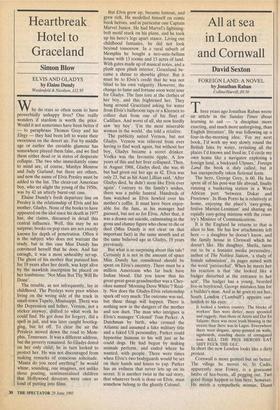Heartbreak Hotel to Graceland
Simon Blow
ELVIS AND GLADYS by Elaine Dundy Weidenfeld & Nicolson, £12.95 Why do stars so often seem to have proverbially unhappy lives? One really wonders if stardom is worth the price. Would it not sometimes have been better if — to paraphrase Thomas Gray and his Elegy — they had been left to waste their sweetness on the desert air. For by middle age or earlier the enviable glamour has somewhere played them false, and we find them either dead or in states of desperate collapse. The two who immediately come to mind are, of course, Marilyn Monroe and Judy Garland; but there are others, and now the name of Elvis Presley must be added to the list. The clean-cut American boy, who set alight the young of the 1950s, was by 42 an utterly burnt-out case.
Elaine Dundy's fresh departure line on Presley is the relationship of Elvis and his mother, Gladys. None of the books to have appeared on the idol since his death in 1977 has, she claims, discussed in detail this central influence. Well, this may be no surprise; books on pop stars are not exactly known for depth of penetration. Often it is the subject who does not warrant the study, but in this case Miss Dundy has convinced herself that he does. And fair enough, it was a most unhealthy set-up. The ghost of his mother that pursued him for 19 years after her death, was kept alive by the mawkish inscription he placed on her tombstone: 'Not Mine But Thy Will Be Done'.
The trouble, as not infrequently, lay in childhood. The Presleys were poor whites living on the wrong side of the track in small-town Tupelo, Mississippi. There was the Depression and father, Vernon, not a sticker anyway, drifted to what work he could find. He got done for forgery, did a spell in jail, and was later caught bootleg- ging, but let off. To clear the air the Presleys moved down the road to Mem- phis, Tennessee. It was a different address, but the poverty remained. So Gladys doted on her only child; he in turn looked to protect her. He was not discouraged from making remarks of conscious solicitude. 'Mama do you need anything?' he would whine, sounding, one imagines, not unlike those pouting, sentimentalised children that Hollywood directors were once so fond of putting into films. But Elvis grew up, became famous, and grew rich. He modelled himself on comic book heroes, and in particular one Captain Marvel Junior. He had Marvel's lightning- bolt motif stuck on his plane, and he took up his hero's legs apart stance. Living out childhood fantasies, he did not look beyond tomorrow. In a rural suburb of Memphis he bought a neo-ante-bellum house with 13 rooms and 13 acres of land. With gates made up of musical notes, and a plush upon plush interior, Graceland be- came a shrine to showbiz glitter. But it must be to Elvis's credit that he was not blind to his own vulgarity. However, the change to fame and fortune soon went sour for Gladys The fans tore at the clothes of her boy, and this frightened her. They hung around Graceland asking for water from Elvis's bathroom taps or a Kleenex to collect dust from one of his fleet of Cadillacs. And worst of all, she now hardly saw 'my boy'. 'I'm the most miserable woman in the world,' she told a relative.
The publicity suited Vernon, but not Gladys. Vernon was relieved from ever having to find work again, but without her boy, Gladys became a secret drinker. Vodka was the favourite tipple. A few years of this and her liver collapsed. Then, in August 1968, Gladys died; she was 46 but had given out her age as 42. Elvis was only 23, but as hi g Aunt Lillian said, 'After Gladys died, he didn't seem like Elvis ever again'. Contrary to the family's wishes, there was a public funeral. Hundreds of fans watched as Elvis howled over his mother's coffin. It must have been enjoy- able for the fans, as his manager had guessed, but not so for Elvis. After that, it was a drawn out suicide, culminating in the gross and clumsy figure who chose to die or died (Miss Dundy is not clear on that important fact) in the same month and at the same believed age as Gladys, 19 years previously.
But what is so surprising about this tale? Certainly it is not in the amount of space Miss Dundy has considered should be spent on Elvis's ancestry. There must be a million Americans who far back have Indian blood. Did you know that his great-great-great-grandmother was a Cher- okee named 'Morning Dove White'? Real- ly. Nor does the Gladys-Elvis relationship spark off very much. The outcome was sad, but these things will happen. There is nothing new in the dangers of the mother and son duet. The man who intrigues is Elvis's manager 'Colonel' Tom Parker. A Dutchman by birth, who crossed the Atlantic and assumed a fake military title and a faked US personality, Parker could hypnotise humans to his will just as he could dogs. He had begun by making animals perform, and ended where he wanted, with people. There were times when Elvis's two bodyguards would be set on their hands and knees to yap. Parker has an evilness that never lets up on its secret. It is another twist in the sad story, that whatever book is done on Elvis, must somehow belong to the ghastly Colonel.


























































 Previous page
Previous page